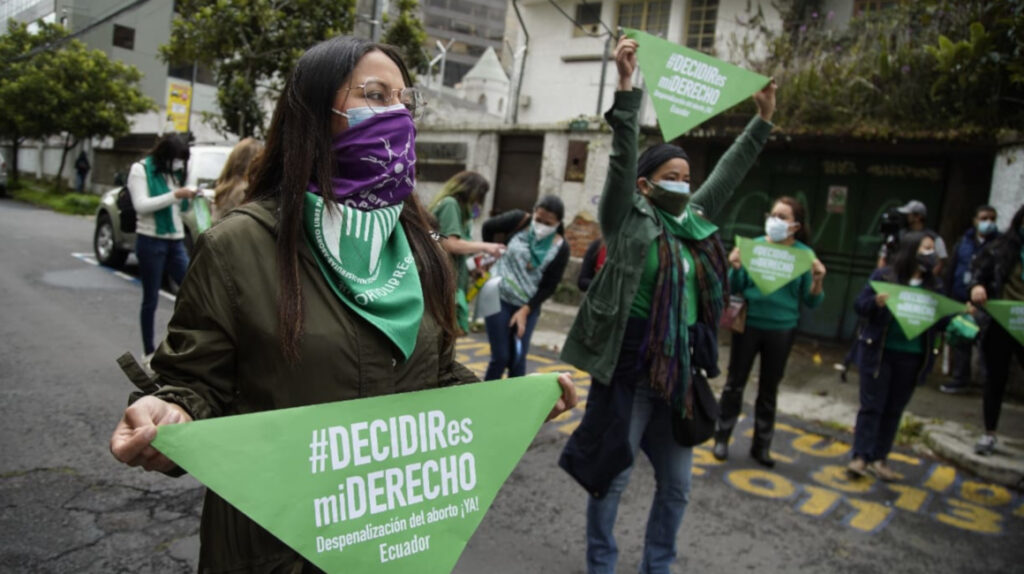In the world, the time to have an abortion varies. This shows that there is no single rule. Activists and experts give their opinion on the 7 months of gestation proposed by the Assembly in Ecuador.
In 134 of the 194 countries of the world, abortion is legal, in at least one reason, for example, that the life of the mother is in danger, rape or fetal malformation. There are even nations like Cuba, where interrupting an abortion is possible without determining causes.
And just as not all nations share the causes, they do not do so when establishing the weeks of gestation in which these procedures are performed.
This – César Paz y Miño, a geneticist, explains, is because there is no established temporality as a general rule. “Whenever you want, you could interrupt the pregnancy,” the doctor emphasizes and reiterates that the risks are not greater for doing it in week 28 (7 months) as proposed by the Justice Commission of the National Assembly, in the case of women over 18 years of age, victims of sexual assault.
While for those under 18 years of age there is no term to access an abortion for this reason.
Rape victims can abort even without regulation
Denial and late seeking help
Ana Vera, a lawyer for Surkuna, defends that setting deadlines limits women’s access. “Because the causal rape is an extreme cause” in which women and girls experience vulnerability factors, which cause them to seek care or help “late”.
But it highlights that 28 weeks is a long time, since most interruptions are made before 24 weeks (only between 3% or 5% do so after that time, according to the World Health Organization, which has a guide to safe abortions). Those women who usually have abortions in the last trimester of pregnancy they are often victims of trafficking; girls incest victims with cover-up processes; women living in remote areas; in human mobility or those who, having been sexually assaulted, go through a denial process, that even makes them discover that they are pregnant in advanced time.
The challenge, says Vera, is that the attention in the health system ensures that the majority of women victims of sexual violence have access to an abortion in the first trimesters. For that, the speed of the system, accompaniment and sexual education is necessary, he says.
A genetic issue
Paz y Miño explains that in countries that have prenatal genetic diagnosis officially, “which is not the case in Ecuador”, they diagnose that the limit for termination of pregnancy is up to week 22; although others open the possibility that the abortion is performed “The moment that the woman feel safe, know exactly what you want and have the adequate scientific advice”, That, says Paz y Miño, should be the criterion in rape cases.
It is estimated that 83% of rapes in Ecuador occur within the family nucleus, which is known as incest. In these cases, explains the geneticist, the risks of malformations or other genetic problems are between 25 to 75% depending on the range of consanguinity. This, says Paz y Miño, should be another criterion to take into account to extend the deadlines to the victims, since between the weeks 12 and 13 there is no option to give a diagnosis genetic.
The doctor agrees with Vera by saying that every procedure has its risk and that the law – that this January 12, 2021 will be treated again in the Assembly Justice Commission– You must ensure that there is no risk of interrupting at any time, even after three or seven months. (AVV)
Times in the world
Argentina: the first 14 weeks of pregnancy, in all cases. Meanwhile, in cases of rape and risk to the life or health of the mother, there is no time limit.
Cuba: its practice has been decriminalized since 1965. Until ten weeks of pregnancy, no reason must be given for opting for this alternative.
Chili: 12 weeks.
Countries Low: up to about 24 weeks pregnant.
England: 22 weeks.
Canada: has no deadlines
Advancement of the law
This January 12, 2022, the Justice Commission of the Assembly resumed the debate on the abortion law for rape at 9:30 a.m.
In the first debate (January 10, 2022) up to article 25 of 66 was analyzed.
The Commission plans for the report to reach the plenary session until January 25, 2022, to be discussed and approved.
Then the President, Guadalupe Llori, must convene the plenary session for the general vote. If the votes are not reached, the project cannot be dealt with within a year.
If it reaches the vote, it will go to President Guillermo Lasso, who could give way to the law or veto it.
???? Abortion by rape is your right
Do you know the steps you must follow to be able to access an abortion for rape by entering our website ????https://t.co/mBGXIWEuOf#FreeEInformed pic.twitter.com/LVveyWtmUG
– Surkuna ???? (@SurkunaEc) January 11, 2022








